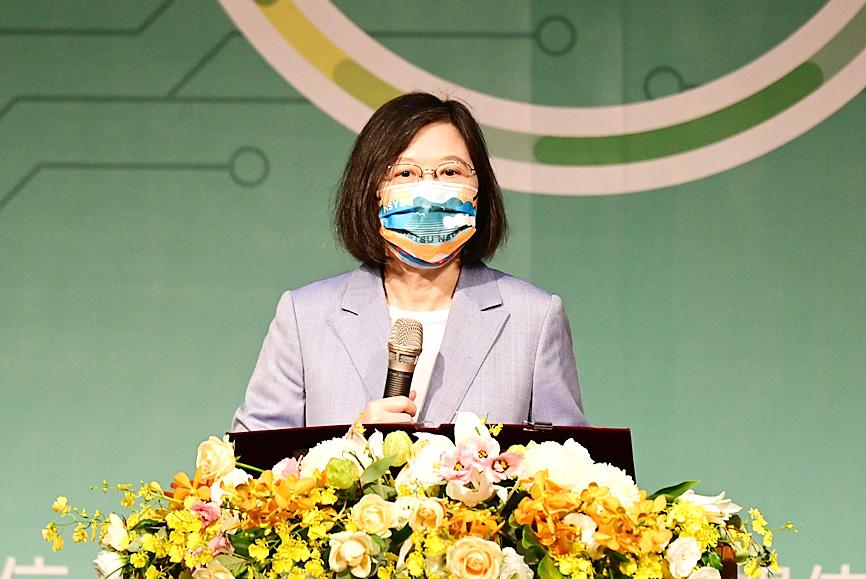National Sun Yat-sen University (NSYSU) and seven local companies in Kaohsiung yesterday inaugurated the institution’s College of Semiconductor and Advanced Technology Research, the latest local university to set up a semiconductor talent cultivator.
The new semicondcutor college would enable the government, academia and industry to cooperate on cultivating talent, President Tsai Ing-wen (蔡英文) told the ceremony.
The semiconductor industry is vital in Taiwan, generating output of more than NT$4 trillion (US$133.71 billion) last year, Tsai said, adding that international demand for Taiwanese semiconductors is growing.

Photo: Lee Huei-chou, Taipei Times
NSYSU plays an important role in cultivating talent in the industry, with the seven companies investing about NT$900 million to foster chip testing and packaging, and electronic components talent over the next 10 years, she said.
Tsai thanked Kaohsiung Mayor Chen Chi-mai (陳其邁) and his municipal administration for cooperating with the central government on the expansion at NSYSU, which in March opened its School of International Finance.
“I am grateful to President Tsai for setting a clear direction for the country’s development, because where the president’s policies are, there are resources,” Chen said.
Also at the ceremony were Democractic Progressive Party Legislator Lai Jui-lung (賴瑞隆), NSYSU president Cheng Ying-yao (鄭英耀), Deputy Minister of Education Lio Mon-chi (劉孟奇), National Development Council Deputy Minister Yu Chien-hwa (游建華) and 300 tech-sector representatives.
“I am grateful to NSYSU president Cheng and all of the university’s staff for their dedication and support of industry,” Tsai said. “Through that dedication and cooperation with the government, NSYSU has inaugurated two new colleges in a short time.”
Huang I-yu (黃義佑), who was NSYSU’s vice president, stepped down to serve as the semiconductor college’s first dean.
Tsai thanked Huang for making the transition, saying it would contribute to the success of the college.
“Tsai’s continued support has allowed higher education in Taiwan to effectively cooperate with industry,” Cheng said. “This has allowed us to keep talent in Kaohsiung, to make our students more competitive and to deploy our skills globally.”

UNCERTAINTY: Innolux activated a stringent supply chain management mechanism, as it did during the COVID-19 pandemic, to ensure optimal inventory levels for customers Flat-panel display makers AUO Corp (友達) and Innolux Corp (群創) yesterday said that about 12 to 20 percent of their display business is at risk of potential US tariffs and that they would relocate production or shipment destinations to mitigate the levies’ effects. US tariffs would have a direct impact of US$200 million on AUO’s revenue, company chairman Paul Peng (彭雙浪) told reporters on the sidelines of the Touch Taiwan trade show in Taipei yesterday. That would make up about 12 percent of the company’s overall revenue. To cope with the tariff uncertainty, AUO plans to allocate its production to manufacturing facilities in

Taiwan will prioritize the development of silicon photonics by taking advantage of its strength in the semiconductor industry to build another shield to protect the local economy, National Development Council (NDC) Minister Paul Liu (劉鏡清) said yesterday. Speaking at a meeting of the legislature’s Economics Committee, Liu said Taiwan already has the artificial intelligence (AI) industry as a shield, after the semiconductor industry, to safeguard the country, and is looking at new unique fields to build more economic shields. While Taiwan will further strengthen its existing shields, over the longer term, the country is determined to focus on such potential segments as

TAKING STOCK: A Taiwanese cookware firm in Vietnam urged customers to assess inventory or place orders early so shipments can reach the US while tariffs are paused Taiwanese businesses in Vietnam are exploring alternatives after the White House imposed a 46 percent import duty on Vietnamese goods, following US President Donald Trump’s announcement of “reciprocal” tariffs on the US’ trading partners. Lo Shih-liang (羅世良), chairman of Brico Industry Co (裕茂工業), a Taiwanese company that manufactures cast iron cookware and stove components in Vietnam, said that more than 40 percent of his business was tied to the US market, describing the constant US policy shifts as an emotional roller coaster. “I work during the day and stay up all night watching the news. I’ve been following US news until 3am

COLLABORATION: Given Taiwan’s key position in global supply chains, the US firm is discussing strategies with local partners and clients to deal with global uncertainties Advanced Micro Devices Inc (AMD) yesterday said it is meeting with local ecosystem partners, including Taiwan Semiconductor Manufacturing Co (TSMC, 台積電), to discuss strategies, including long-term manufacturing, to navigate uncertainties such as US tariffs, as Taiwan occupies an important position in global supply chains. AMD chief executive officer Lisa Su (蘇姿丰) told reporters that Taiwan is an important part of the chip designer’s ecosystem and she is discussing with partners and customers in Taiwan to forge strong collaborations on different areas during this critical period. AMD has just become the first artificial-intelligence (AI) server chip customer of TSMC to utilize its advanced